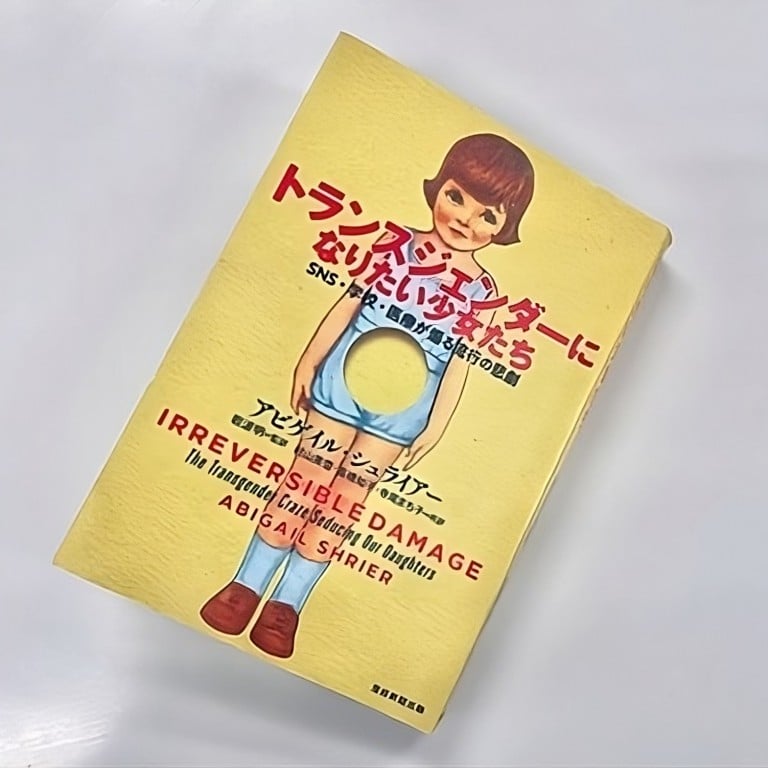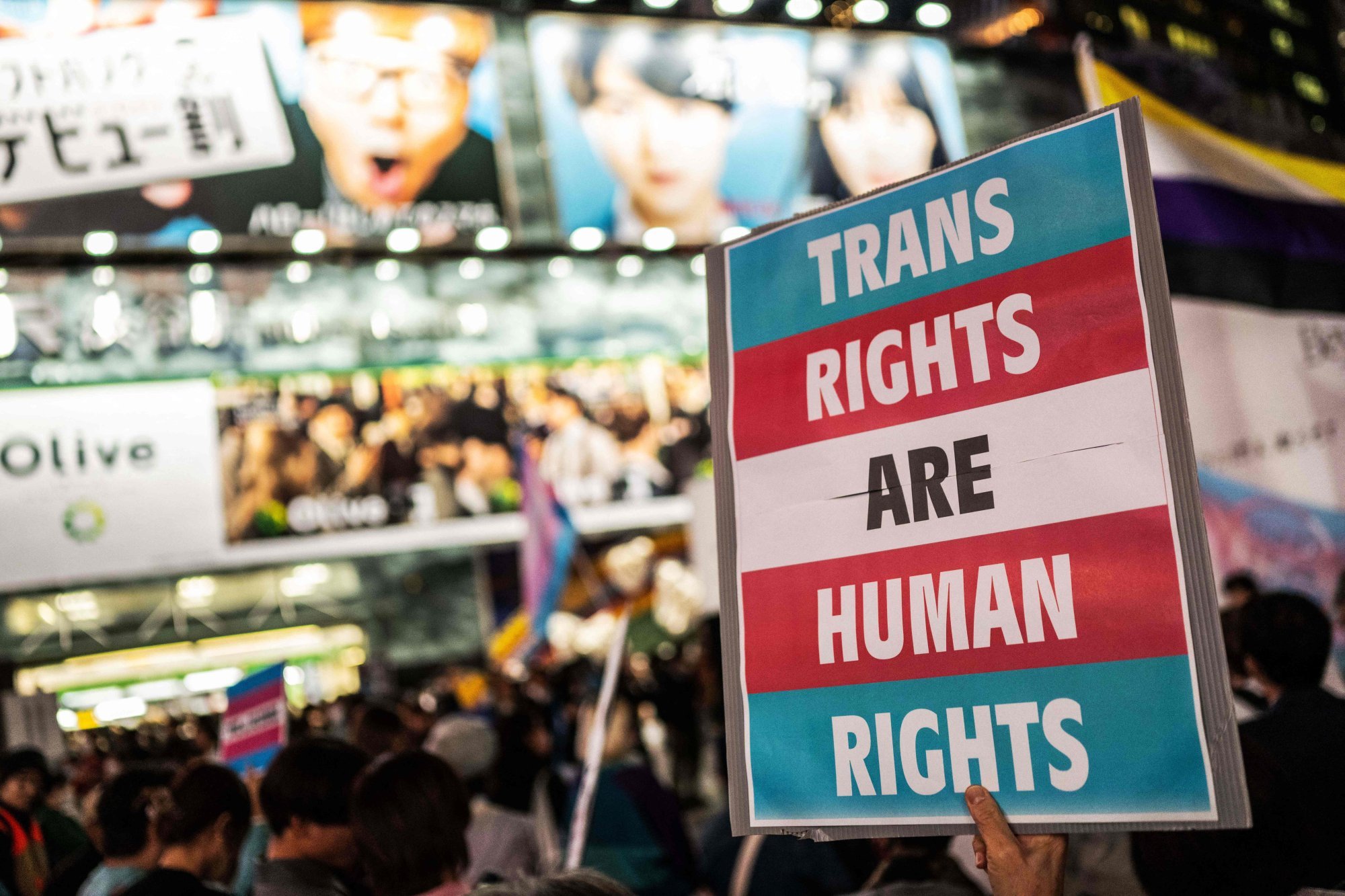
In Japan, US book on transgender surgery for young people sparks threats, heated debate
- The furore started after a conservative newspaper released a translated version of ‘Irreversible Damage: The Transgender Craze Seducing Our Daughters’
- Sankei, the newspaper that published US journalist Abigail Shrier’s book, called the ‘outrageous’ backlash an attempt to stifle free speech in Japan
Earlier this month, Sankei Shimbun Publishing released the Japanese-language version of Irreversible Damage: The Transgender Craze Seducing Our Daughters, a book by US journalist Abigail Shrier.
Police say bookstores carrying the title, as well as the newspaper, have received threats from unidentified parties opposed to its publication. In one case, a message sent to a major bookstore warned that a fire would be started in the shop on the day the book was released.
The Sankei newspaper’s refusal to bow to what it claims is an assault on free speech has attracted support from across the political spectrum.
“It’s appalling that far-left groups are attempting to intimidate publishers and bookshops and trying to influence what people can read, and I am glad that they are not succumbing to that pressure,” Yoichi Shimada, a conservative academic, told This Week in Asia.

Shimada first read the English version of the book shortly after its release in 2020 and recommended to the newspaper that it be translated for the Japanese market.
Sankei has filed a police complaint on the grounds of obstruction of business. It also accused opponents of the book of attempting to stifle free speech in an editorial published on April 10.
Describing efforts to intimidate the newspaper and retailers as “outrageous”, the editorial added: “No matter what the ideological motive, it challenges the freedom and democracy enjoyed by Japanese citizens.”
The Sankei group “will never succumb to such threats”, it added. “We condemn such conduct in the strongest possible terms.”
“Sankei is being very courageous in the face of these threats of violence,” Shimada said. “But I must emphasise that the decision to print the Japanese-language version is simply a matter of common sense.”
Originally, Kadokawa Corp was slated to release the Japanese version of the book, but the publisher backed away from the project after it received complaints that the book encourages discrimination against transgender people.
‘Deeply hurt’: anti-trans hostility rises in Japan after LGBTQ protection law
In response to the furore, some shops have decided not to stock the book, a decision Shimada described as “shameful”.
“Book shops should stand up for the right of authors to write and provide different opinions on issues, whether it’s a work of fiction, a ‘manga’ comic or a book written by an LGBTQ author,” he said.
Written by Shrier, a journalist for The Wall Street Journal, the book examines gender dysphoria, or severe discomfort with a person’s biological sex. Shrier cites data suggesting gender dysphoria was extremely rare until a few years ago, arguing that the recent increase in cases was caused by young women being swayed by popular culture and declaring themselves transgender, leading them to undergo gender-affirming procedures that are irreversible and life-altering.
“This is a dangerous ideology,” Shimada said. “Especially for teenage girls, who are so easily influenced by the latest trends or activists for a leftist culture that they really do not understand at such a young age.”
Makoto Watanabe, a communications professor at Hokkaido Bunkyo University in Eniwa, Hokkaido, is on the opposite side of the political spectrum to Shimada but shares many of his concerns about the limits being placed on free speech due to the saga.
“I have seen the book in shops, and it struck me that there was a sticker on the front that said, ‘This is not hate speech’,” he said.
“I support the freedom of expression and free speech, so if the content of a book is not illegal then I think the author and the publisher should have the right to release it,” he said. “If we shoot down opinions that are different to our own, then how will we ever get to hear other perspectives or ideas?”

“Young people can be far too easily influenced by people around them, the latest fashion or something they have seen on the internet,” Watanabe said.
“That is risky, and I believe that a decision so life changing as gender reassignment cannot be made by a child. They could later regret their decision, by which time it is already too late.”
“Attacks on transgender rights are already increasing in Japan, both on social media and in the Diet,” she said, referring to Japan’s parliament. “This book can add fuel to that fire.”
Calling Japan’s current laws on LGBTQ rights “quite weak”, Doi said parliament had been unable to introduce the anti-discrimination legislation that the country’s LGBTQ community “has been demanding for nearly a decade, and instead passed a law on the ‘promotion of understanding’ of minorities’ rights”.
Toilet limits for transgender woman ‘unacceptable’: Japan’s top court
Mayu Aoyama – a campaigner with Rainbow Family Japan, an advocacy group for LGBTQ families – was more scathing of the book, saying its premises were based on fundamental flaws.
The book claims that it is “easy” to undergo gender reassignment surgery in the US, Aoyama said. But in Japan, paediatric psychiatry does not recommend gender reassignment surgery for minors and such surgery is not performed on them, she said.
According to Aoyama, non-profit organisations that deal with young transgender people do not encourage “easy” gender reassignment.
“The book also appears to be a medical book at first glance,” Aoyama said. “[But] there are numerous passages where the author appears to have deliberately misused the data to support her claims.
“Transgender people are a very small proportion of the population, but they are clearly present … No one can say that their existence is ‘a mistake’.”


